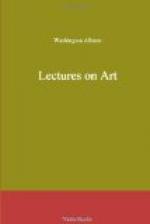It has doubtless been observed, that, in this inquiry concerning the nature and operation of the first characteristic, the presence of the second, or verifying principle, has been all along implied; nor could it be otherwise, because of their mutual dependence. Still more will its active agency be supposed in our examination of the third, namely, Invention. But before we proceed to that, the paramount index of the highest art, it may not be amiss to obtain, if possible, some distinct apprehension of what we have termed Poetic Truth; to which, it will be remembered, was also prefixed the epithet Human, our object therein being to prepare the mind, by a single word, for its peculiar sphere; and we think it applicable also for a more important reason, namely, that this kind of Truth is the true ground of the poetical,—for in what consists the poetry of the natural world, if not in the sentiment and reacting life it receives from the human fancy and affections? And, until it can be shown that sentiment and fancy are also shared by the brute creation, this seeming effluence from the beautiful in nature must rightfully revert to man. What, for instance, can we suppose to be the effect of the purple haze of a summer sunset on the cows and sheep, or even on the more delicate inhabitants of the air? From what we know of their habits, we cannot suppose more than the mere physical enjoyment of its genial temperature. But how is it with the poet, whom we shall suppose an object in the same scene, stretched on the same bank with the ruminating cattle, and basking in the same light that flickers from the skimming birds. Does he feel nothing more than the genial warmth? Ask him, and he perhaps will say,—“This is my soul’s hour; this purpled air the heart’s atmosphere, melting by its breath the sealed fountains of love, which the cold commonplace of the world had frozen: I feel them gushing forth on every thing around me; and how worthy of love now appear to me these innocent animals, nay, these whispering leaves, that seem to kiss the passing air, and blush the while at their own fondness! Surely they are happy, and grateful too that they are so; for hark! how the little birds send up their song of praise! and see how the waving trees and waving grass, in mute accordance, keep time with the hymn!”
This is but one of the thousand forms in which the human spirit is wont to effuse itself on the things without, making to the mind a new and fairer world,—even the shadowing of that which its immortal craving will sometimes dream of in the unknown future. Nay, there is scarcely an object so familiar or humble, that its magical touch cannot invest it with some poetic charm. Let us take an extreme instance,—a pig in his sty. The painter, Morland, was able to convert even this disgusting object into a source of pleasure,—and a pleasure as real as any that is known to the palate.
Leaving this to have the weight it may be found to deserve, we turn to the original question; namely, What do we mean by Human or Poetic Truth?




